#Professional Doctorates
Explore tagged Tumblr posts
Text
I think this is just a trend everywhere but I've been very frustrated this week by how much admin work is being outsourced to me as the patient/customer.
My orthodontist tells me I can make an appointment with the surgeon. I call the surgeon. They tell me I need a new referral. I call the orthodontist. They do a referral. I call the surgeon. Referral didn't come through. They tell me about their special unique system we have to use. I call the ortho again and walk them through the referral. I call the surgeon. They say the referral was missing some details so they have to do it again. I call the ortho.
The insurance company calls me about repair shops. I give them the name of the repair shop which I already gave them yesterday. They say they're not in their system but I can use them, but I have to call the repair shop to ask them to contact the insurance company. I call the repair shop and they say the insurance company is supposed to email them.
I feel like at a certain point these constant fetch quests become unreasonable?? Is it too much to expect these groups to communicate with each other instead of making me run back and forth between them???
#if the referral is inadequate why don't you tell the referring doctor directly?#instead of waiting several days for me to call you and THEN saying it's wrong#and making me take care of it#don't get me started on the professionally threatening email I had to send the regional director#for her to FINALLY send us an email introducing our new manager who was supposed to start 4 days ago
15K notes
·
View notes
Text
PhD by Publication: A New Era in Doctoral Education
Doctoral education was traditionally accepted as a laborious time-consuming process requiring at least three years of academic study together with the writing of an extensive dissertation. However with academia trying to meet such diverse professional and academic missions, alternative courses have emerged under the title PhD by publication. This presents a perfect opportunity for any researcher professional or academic, to produce a doctorate based solely on work previously published.
We are going to consider the PhD by publication, discussing its advantages, structure, and potential pitfalls. We shall also respond to some frequently asked questions so that the reader will get a full picture of this fast-emerging alternative.
What is a PhD by Publication?

A PhD by Publication, often referred to as a PhD by Published Works, is a doctoral degree granted without a traditional thesis. Rather, it is granted upon the basis of a portfolio of peer-reviewed and published research papers. Candidates put together their publications and present them as evidence of research contribution to a particular area of study.
Unlike the traditional doctoral programs, this PhD by Publication acknowledges existing contributions through previously published work by formalizing them.
Who is Eligible for PhD by Publication?
The program of PhD by Publication suits mostly:
•Experienced Academics and Professionals: Those with a record of publication in their subject area.
•Practicing Researchers: Professionals who have contributed large amounts of research within an organization.
•Mid Career Academics: Those who want formalization of their work for career elevation.
Eligibility can be based on:
1.Significant quantities of published work in journal articles.
2.Research that is novel to the field and contributes sufficiently.
3.Exhibits coherence in its body of work.
Benefits of Doctorate by Publication

1.Recognition of Present Work:
This route legitimizes the work done through research and contributions by one in the professional world, thus avoids duplication.
2.Time Saving:
Since most of the work is already done, candidates can concentrate on synthesizing their work and writing the contextual overview.
3.Flexible Approach:
It is suitable for professionals who have to balance work, research, and personal commitments.
4.Career Advancement:
A PhD can result in higher academic positions, greater credibility, and more opportunities for funding.
5.Cost-Effective:The shorter time frame and streamlined focus can reduce overall costs compared to a traditional PhD.
PhD by Publication Structure
1.Portfolio of Publications: The core requirement is the aggregation of peer-reviewed papers, book chapters, or equivalents of published works that document considerable contributions to the body of knowledge.
2.Contextual Narrative: Students are required to deliver a comprehensive introduction or summary-often referred to as synthesis chapter or contextualizing statement-that weaves the output of the publications into one cohesive body of work
3.Oral Defense: Similar to more conventional PhDs, oral defense in front of a committee of academics may also be required
4.Institutional Requirements: Each university can have different requirements in terms of the number and type of publications, the time of publication, and the type of contextual overview.
PhD by Publication Challenges

1.High Academic Standards: The research is required to be highly academic since only peer-reviewed and impactful publications are accepted.
2.Coherence Across Works: It may be difficult to ensure that varied publications tell a cohesive story.
3.Not Recognized in Some Countries: While it is gaining popularity, the PhD by Publication is not widely accepted or acknowledged.
4. Long Process for Application: It is not an easy process to contextualize and defend published work.
Trends in PhD by Publication Across the World
1. United Kingdom and Europe: The UK and Europe were the first to take on the PhD by Publication, and it has been quite a common route for several years.
2. Australia: Institutions in Australia usually provide this route to mid-career professionals and academics.
3. United States: While less prevalent, some American universities are starting to consider the model, especially in interdisciplinary fields.
4. Asia: The idea is taking off in parts of Asia, particularly for professionals in fast-growing industries.
Is PhD by Publication for You?
You should select this route if your professional and academic life meets the following criteria:
•Are you an established researcher with a strong publication record?
•Do your publications collectively demonstrate significant and original contributions?
•Are you in search of a flexible route to formalize your research achievements?
If the answers are "yes," then a PhD by Publication could be the ideal choice.
Frequently Asked Questions About PhD by Publication
Q1. How many publications are required for a PhD by Publication?
The number varies from institution to institution but typically ranges from 4 to 8 peer-reviewed articles.
Q2. Can I use co-authored papers for my submission?
Absolutely; co-authored papers can be included, but you do need to clearly demonstrate your contribution.
Q3. What is the duration of completion for a PhD by Publication?
It is shorter compared to traditional PhDs that last 1–2 years.
Q4. Does every university offer a PhD by Publication?
No; not all universities offer such a program. It seems to be more common within institutions that focus on applied research and professional development.
Q5. Can I attempt the PhD by Publication if my first degree is not available or exists?
In general candidates are expected to have already attained a master's or other equivalent professional experience at entry.
Conclusion
The PhD by Publication heralds a new world for doctoral education, offering accessible and time-effective routes in order for professionals and practitioners alike to gain formal award and recognition for their existing published work.
Candidates can gain an honored qualification and continue advancing through their careers by leveraging all of their existing work.
As academic landscapes are changing, this model draws attention to the importance of adaptation and diversity in university education and opens the possibilities for professionals from other spheres.
For candidates having a rich portfolio of impact research, the PhD by Publication is more than being an option; it serves as a chance to get their legacy in academia carved in stone.
#Peer-Reviewed Publications#Alternative Doctoral Pathways#Professional Doctorates#PhD by Published Works#Research-Based Doctoral Degree
0 notes
Text
“My girlfriend will be upset if she sees you touching me like that on my chest,” Carlos murmured, high as fuck post surgery.
“Sir—” you sighed, removing the stethoscope from his chest. You straightened the lapels of your white coat. “I’m your doctor.”
Carlos Sr. made an amused noise from his chair beside his son’s hospital bed. He gestured towards you.
“You don’t have a girlfriend,” Carlos Sr. told his son.
“Oh,” Carlos blinked his big, brown eyes. “I don't?”
Carlos was certain he had a girlfriend. They've been dating for over four years now. Their relationship was kept from the world as his girlfriend wanted to focus on her job without being bombarded by Carlos' millions of fans in her workplace and Carlos respected that, although he was not exactly the type who liked the idea of secret relationships. What did she do again? Carlos couldn't remember. The anesthesia was making everything whoozy for him.
“That's your wife, son.”
Carlos moved his gaze to your coat—[Name] [Surname]-Sainz, M.D., Chief of Trauma Surgery.
"Oh."
You raised an amused brow at his dumbstruck face, his beautiful brown eyes wide and his mouth agape. You shook your head at your husband's adorableness, smiling affectionately.
#carlos sainz#carlos sainz x reader#carlos sainz imagine#fluff#f1 imagine#f1imagines#cs55 x reader#cs55#doctor! reader#is this a breach of professionalism
5K notes
·
View notes
Text
something silly from yesterdays evening class



...


#liu qingge#luo binghe#mu qingfang#cameo from shen qingqiu also lol#anyway i only had my too hard pencil with me and a bigass eraser so its nothing much but who cares i thought its funny hjksf#LBH outside like wow this is..so stupid#LBH inside 'is that an important quality shizun looks for in a man?? am I delight at the doctors?? (thinks back to the kidnapping incident)#meanwile lqg being delusional king godspeed#not single one out of them is a good patient btw all of them are on thin ice#also i think mqf gets exasperated with everyone becasue everyone on that mountain is a disaster but doesnt show it usually#mostly just passive agression cuz hes professional and serene and all taht#BUT#i think it would be funny if LQG just grinds his gears so much with his reckless behaviour#so that most of the time hes the one who pushes him to actually outwardly snap#fhdjkshfk
906 notes
·
View notes
Text
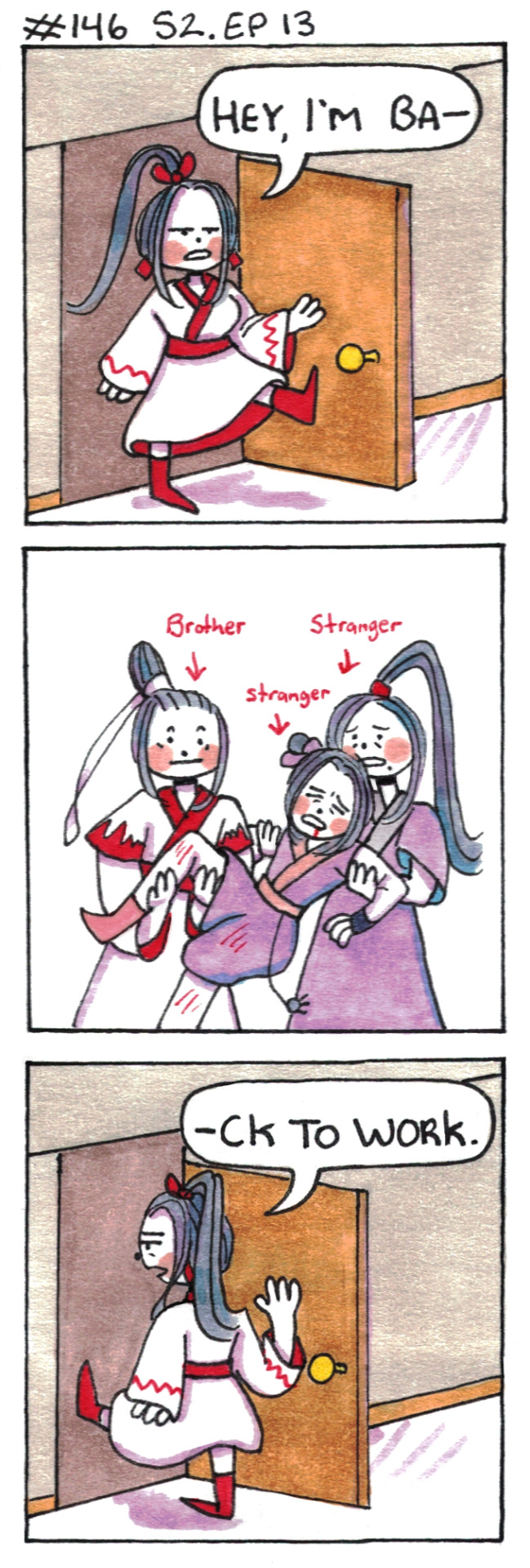
An unbothered queen has entered, and subsequently left.
[First] Prev <–-> Next
#poorly drawn mdzs#mdzs#wen qing#wen ning#jiang cheng#wei wuxian#In the audio drama she quite literally opens the door and then leaves after seeing them without breaking conversation.#It is both so impressive and deeply funny to me.#I imagine her just literally pivoting in one foot and walking right out.#She came home after a long day at work and in 0.5 seconds went “I would rather go back to the office than deal with this right now”.#Besides tickling me to near tears - this scene is also a great introduction to Wen Qing - her first instinct is to protect!#She lives by the code of 'I don't care who you are - if you need help I will lend it.' a true doctor and professional.#Sure she is *mad* that Wen Ning puts himself (and her to a lesser extent) at risk by helping 'the enemy' but she gives in quick.#I love Wen Qing a lot - she is such an unsung hero in this story.#Sorry that her first appearance on this blog was...what it was. I'll let your curiosity take you down that path...
2K notes
·
View notes
Text
I hate to break it to you guys but vets, doctors, and other medical professionals are not automatically scientists and in fact have to work hard to actually be scientists
They are extremely well trained mechanics for the world’s most complicated machines. Not the same as a scientist.
For example: I know of several young earth creationist doctors
For example: many doctors refuse to follow the evidence we have about obesity, but continue to use their outdated ideas on the topic
For example: my vet always learns something new from me about the science around parrot behavior when I come in with my birds for check ups, and she actually does try to keep up
For example: premed training doesn’t require a scientific major
Saying “a doctor said X” or “a vet said Y” is pretty much meaningless unless said medical professional also does scientific work, which is never guaranteed.
825 notes
·
View notes
Text

One day Soundwave will learn to keep his mouth shut
#gave the creepy Autobot doctor 1 (one) compliment in a panicked ramble and he hasn’t shut up since#professional yapper#red draws#transformers#maccadam#transformers g1#ratchet#soundwave#soundchet#shattered glass#transformers shattered glass
888 notes
·
View notes
Text
"rank the doctors" based on what!? which one is my favourite? which one i think is objectively the best? which one is most fuckable? which one has the nicest voice? best costume? best actor? best writing?
#doctor who#the doctor#nuwho#new who#9th doctor#10th doctor#11th doctor#12th doctor#13th doctor#ninth doctor#tenth doctor#eleventh doctor#thirteenth doctor#twelfth doctor#the answers to these in order are:#ten- nine- ten- eleven- eleven- twelve- ten#we are at 550 notes and I am back with edits to the tags...#a few other ways to rank them. including but not limited to#“most likely to trip and fall” “most gender” “best cook” “coolest stims” “flavor. scent”#one person didn't realize that this was a doctor who post until they reached “best costume”#which means that they thought the previous questions were normal ones to ask about medical professionals#so many notes what the HELL is going on here /ref#1218 notes?? awww you shouldntve! for me?#AIGHT YALLSEY ON INSTA JUST POSTED THIS WHAT THE FUCK WHAT THE FUUUCK#more options: “best at defeating an angry chihuahua” “best tardis console room”#2k#i guess
2K notes
·
View notes
Text
“As Kennedy pushed his anti-vaccination campaign — which Green has referred to as disinformation — the inoculation rate plummeted to 31% and the measles virus spread. Samoan leaders asked the Hawaii governor for help, so he went to their island with dozens of health care providers to help vaccinate as many people as possible. By this time, there were approximately 5,000 confirmed cases of measles, Green said, and the outbreak would lead to more than 80 deaths, most of them among children.
“This is no joke when you see pictures of a child with measles, when there are no hospitals around, when there are no ventilators to keep them alive,” said the Hawaii governor. “We witnessed a child literally dying in front of us, just moments as we came into the village. ... She was still warm when I put my hands on her face.”
#rfk jr killed 80 people#rfk jr will kill you and your kids#rfk jr will cause massive disease outbreaks#rfk jr is not a doctor or medical professional#anti-vaxx assholes#Qanon assholes#republican assholes#maga morons#trump sycophants#maga cult#rfk jr caused a measles outbreak that killed in Samoa
165 notes
·
View notes
Text
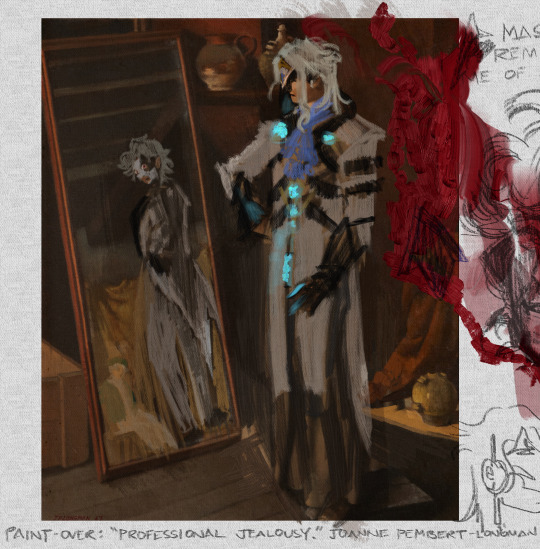
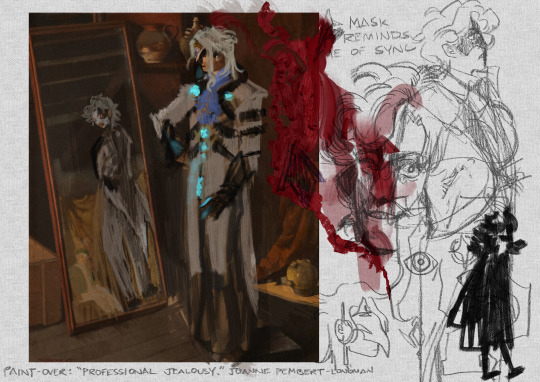
dottore doodles
#'professional jealousy' is one of my favourite paintings#the subject posing and observing herself is a mannequin! the actual model can be seen within the mirror's reflection#i thought it would fit the doctor :)#in-game doctor might just be a redesign but nothing wrong w a little fantasizing#dottore looking @ versions of himself#although all his segments are arguably 'genuine' to who he is#i like to think of the embittered young dottore in the akademiya#and his memory lingering as dottore changes...#france art#genshin impact#il dottore#dottore#JUST NOTICED I DIDNT PAINT HIS LEGS...
152 notes
·
View notes
Text
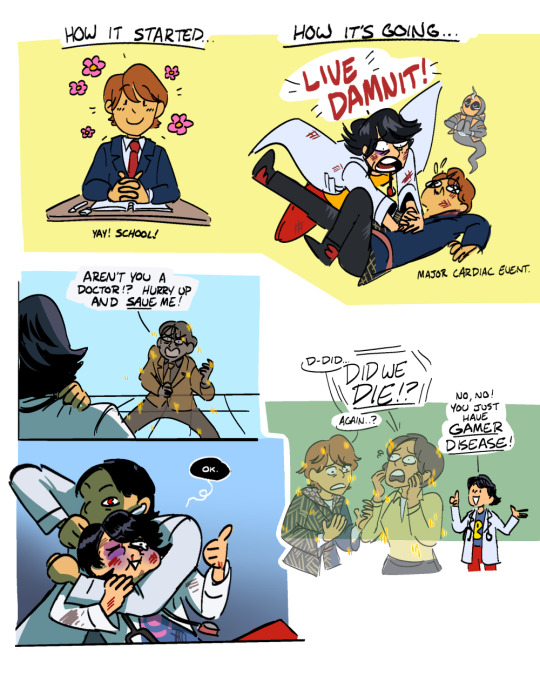


I wanna laugh and say the Ghost/ExAid movie was the most un-serious thing i've ever seen but it was actually so stressful. Nice job writers!!
Putting this one under the cut cause I gave up on it lol:

#it was great!#everyone had a bad time!!!#except for pacman... sources say he's doing good now!#kamen rider#kamen rider ghost#kamen rider ex aid#fan art#comic#hojo emu my other son...#the only one with ANY bedside manner lol#man the writers really took a look at both series and were like...#'everyone's seen Takeru die already and we've got a show full of medical professionals so why don't we just smack the heck out of everyone?#'also can we get pacman cleared?? we need him it'd be so funny.'#'we're gonna have the one kamen rider called 'Ghost' in our show about dirty filthy gamer doctors we have ONE SHOT at this!!'
384 notes
·
View notes
Text
honestly you probably shouldn't go into the medical profession if you aren't prepared to treat patients with dignity and respect - even if your job exploits you, even if your bosses suck, even if you're exhausted.
yes, you are allowed to have feelings and be tired. but you have to be willing and able to either admit when you can't do something (and take the consequences), or put how you feel aside and do your job. for the sake of your patient.
you and your job may be harmed by the medical industrial complex's wrongness, but to your patients, you are part of the complex that is also gravely failing them. you have the power to be a force of goodwill and care, or an instrument of oppression.
that is what you're signing up for when you become a medical professional. don't like it? don't become a medical professional.
#softspoonie#medical industry#medical professionals#medical#medical system#medical ableism#medical abuse#medical trauma#disability advocacy#health#health advocacy#ableism#systemic ableism#systemic oppression#nurses#doctors#medical neglect#medblr#medical student#medical studies#medical malpractice
645 notes
·
View notes
Text

#I’ve had good doctors most of my life but FUCK every medical professional who’s been gaslighting me over my TMJ disorder#chronic illness#chronic pain#chronically ill#chronically in pain#tmj#tmj disorder#tmj pain
103 notes
·
View notes
Text
mentioned Ibe in the previous post so in case anyone doesn't know him he is a doctor who makes medical illustrations showing black people.






and my personal favourite:

#dengue one is personal yeah I got comments on how at least it doesn't look so bad on my skin#because lighskin as I am rash still looks more brown than bright pink on me. but we associate it with the bright pink spots#even if it's mainly pardas and black women catching it so yeah it changed something in me seeing a black man in the drawing#it's not by him I think the illustrator is a woman doctor even but his association does have a drawing of a black woman bit by a mosquito#which isn't something I expected myself to be so excited and emotional about but. yeah#my first contact with him was in one of my classes in college about publishing school materials#and fuck if it didn't solidify a lot of reflection about the images that go on textbooks#which yes. includes women only appearing if the condition is exclusively of the female sex in this#but fuck if his work didn't make me cry. I'm an educator and the daughter of a black healthcare professional. and I never thought about it#how every single anatomical drawing I had seen in my life and even photographs of medical conditions. had been of white people#I come from a predominantly black family with a history of skin cancer dammit. I had never questioned it. part of me was embarrassed of me
128 notes
·
View notes
Text
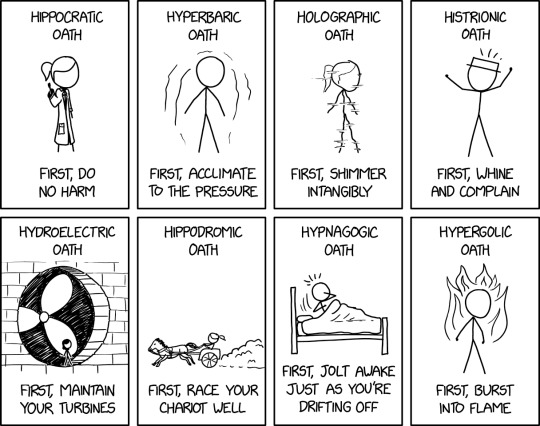
Interpretations of the Hermeneutic Oath differ.
Professional Oaths [Explained]
Transcript Under the Cut
[8 Panels in a grid.]
Hippocratic Oath [Ponytail in a doctor's coat with her arm raised in pledge.] First, do no harm
Hyperbaric Oath [Cueball shaking.] First, acclimate to the pressure
Holographic Oath [A hologram of Ponytail fitzing in parts.] First, shimmer intangibly
Histrionic Oath [White Hat yelling, fists upraised.] First, whine and complain
Hydroelectric Oath [Megan sat in the cut-out wall for a giant turbine.] First, maintain your turbines
Hippodromic Oath [Ponytail in a chariot pulled by a horse.] First, race your chariot well
Hypnagogic Oath [Cueball, half-risen from bed in shock.] First, jolt awake just as you're drifting off
Hypergolic Oath [Cueball on fire.] First, burst into flame
#xkcd#professional oaths#xkcd 2843#webcomics#hippocratic oath#doctors#hyperbaric#holograms#histrionics#hydroelectric#turbines#chariots#hippodrome#hypnagogy#hypergolic propellant#hermeneutics
675 notes
·
View notes
Text
You know, I think Clara knew about Amy.
Not at first, of course, but Clara grew up with her --- that is, grew up reading Amelia Williams books. And they were precious to her, books she's read many times over the course of her childhood -- how else does she know exactly which chapter holds what in the book she gave Artie? Perhaps she has always felt connected to her, this moderately obscure children's fantasy author, following in the footsteps of E Nesbit; this contemporary (and sometime friend (oh yes!) ) of Edward Eager's; although not nearly as widely known as either of these. Perhaps because of her choice to publish openly under a "woman's name", thus, in the time in which she lived, relegating her books to the inferior realm of "girls' books", despite the more than equal balance of male viewpoint characters.
But Amelia Williams is different from these authors too -- often fantasy, but sometimes more like early science fiction, a barely- recognized pioneer in both genres. Her views were feminist and daring. In so many ways she was ahead of her time, and the innovations she imagined! almost as if she knew what the future would hold.
And if Clara knows and loves her books so well, she can hardly fail to recognize the most frequently repeated character archetype in them. especially after she rereads a few on a subconscious hunch, during that summer after the Maitlands found a permanent nanny and she insisted that before anything else, she go off and fulfill her original travel plans from 101 Places To See. (The Doctor purported to leave her alone to forge her own way with this, but was in actuality very bad at that, and kept popping up nearly every place she went.) She's Clara, she's clever, how can she fail to look up from her book and notice that the person who's just appeared out of nowhere to stand in front of her with a plate of jammie dodgers and a goofy smile has stepped directly out of the pages?
And then of course, there are the dedications. Sure, there's normal stuff like "to my daughter", "to my loving and patient husband", and "to my parents, who are children now" which is rather weird and whimsical, but fits in with the fantasy author's signature style of dream-like imagination.
But the majority of Amelia Williams' dedication pages say things like "to You", "to My Doctor", "to My Raggedy Doctor" "to my raggedy man" (weird but clearly connected to the other variants), and, cryptically, over and over again: "to you", "to you", "to you", "to you (wherever in time and space you are)".
There's "to my imaginary friend" and "to my imaginary friend, and to all children who have an imaginary friend" and "to my imaginary friend, and every child in the universe who's ever met him, or ever will". Nerds and English teachers have occasionally debated what, if anything, she meant by all this, and now Clara thinks she knows, but she can never say....
And then there are the nights that the Doctor wakes up crying out for "Amy!" and then refuses to talk about it when Clara asks, refuses to acknowledge ever even knowing an Amy, "well everyone shouts random things when they're asleep, it doesn't mean anything" and "I don't remember." if pressed for details about his dreaming. And later he might go off somewhere and cry quietly, reading a book he never lets Clara see.
And then he regenerates, and calls out for "Amelia!", "the first face this face saw."
There's newborn twelve, with his Scottish accent, letting her name slip. It's the first - and only - time he's spoken of her while awake and not actively dying. And Clara is too busy with the immediate threat to their lives to think about it in the moment, but at this point she at the very least has a hunch about the connection between him and the Scottish-American author with the rather opaque background --- that as far as anyone can trace it (although to be fair, no one really cares enough to try very hard) she and her husband just kind of appeared out of nowhere in pre-WWII New York. It seems kind of obvious, now, that the doctor would have had a hand in that.
And now with all the books everywhere, the library gradually migrating into the console room, what else is obvious is that he owns every single one of her books. multiple copies, first editions, last editions, signed copies, mass paperbacks, everything. There's a TARDIS key hidden in a well-worn, well-loved, tear streaked copy of The Cuckoo And The Doll's House, which Clara finds when she's cataloging all the locations of TARDIS keys, just in case she should ever need that information one day.
This all is enough for Clara to know. There doesn't really need to be any more proof, but there is. What totally and fully clinches it are the pictures. Tucked in the pages of another tearstained book (The Beast Below this time), are photographs of Amelia, looking just as she does in her black and white author photos, but younger, and in 21st century clothes. Elsewhere, later, she finds photo booth polaroids of a still younger Amelia, goofing off and smiling. Some of them feature another young man Clara doesn't recognize, and some of them feature the Doctor. He's wearing a tweed jacket instead of his purple wool, and no vest, but otherwise he is exactly the same as the Doctor she first met. The three of them hang off each other like old friends, like family.
idk how to end this.
#clara oswald#amy pond#augh i just! so many feelings about post-TATM writer Amelia#she made the doctor up and then she grew up to Make Him Up professionally#she created him she created him she created him#lavender thoughts#dw#ndw#doctor who#meta#ANOTHER dw ficlet/meta in one day i am on a roll#like six half finished ones in my drafts too btw#lavender writings
269 notes
·
View notes